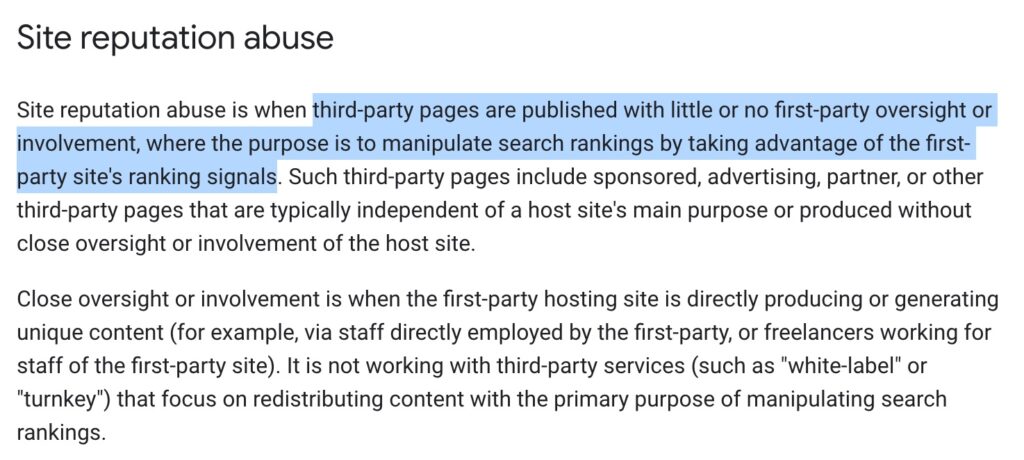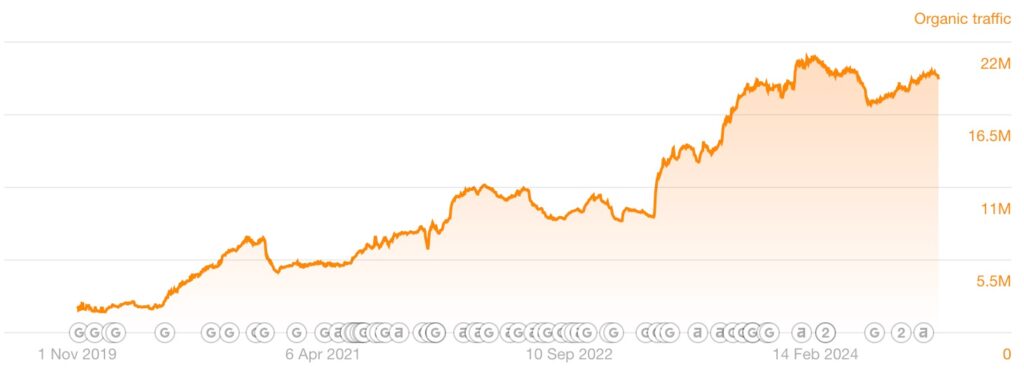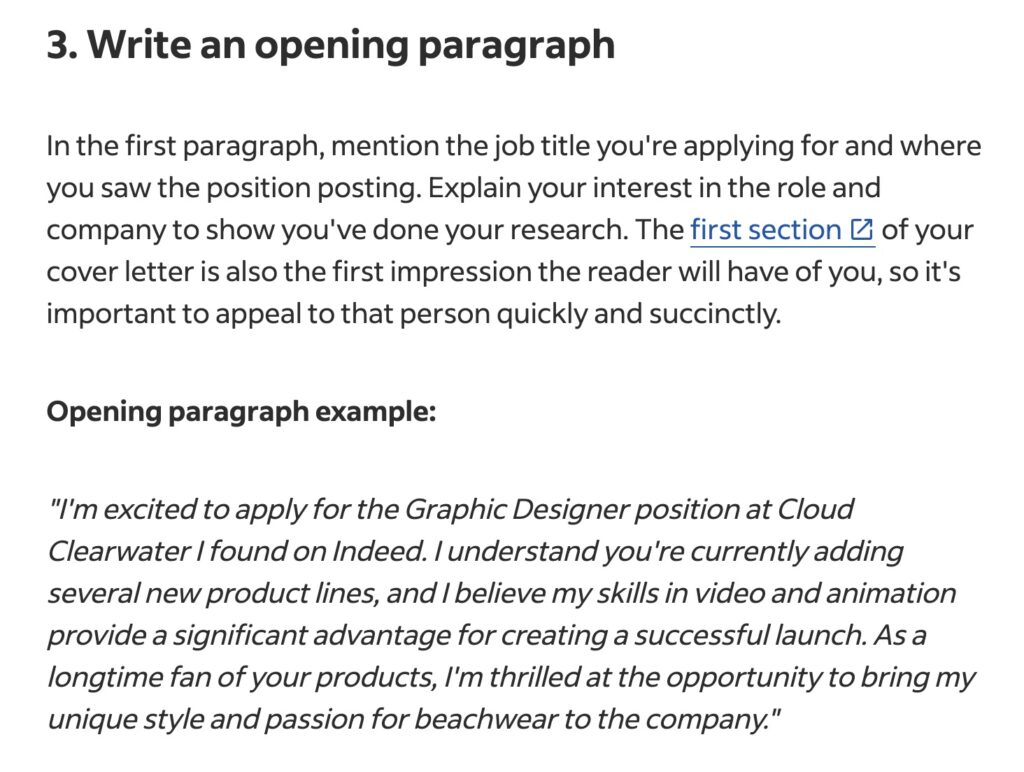Site reputation abuse is when a third-party abuses the reputation of a domain to rank a bunch of pages in Google. The SEO community refers to this type of thing as parasite SEO.
Google has gone so far as to publish an official policy (documented here) on how this isn’t allowed:

Site reputation abuse (parasite SEO) is rampant today. I made the case that Forbes Marketplace is a third-party from Forbes, they also manage sections of CNN and USA Today.
TONS of other media sites have partnerships like this. It’s so pervasive that we could call the current SEO environment the Parasite SEO Era.
Now, you may think that I’m a fan of the Site Reputation Abuse policy from Google.
I’m not.
I hate the fucking thing. It’s colossal stupidity.
It Shouldn’t Matter Who’s a Third Party and Who Isn’t
Let’s look at an extremely common example from the world of content marketing.
Tons of marketing departments outsource all their blog production to content agencies. It’s a massive industry. I’ve built several blogs for clients as a service provider doing exactly this.
The site owner comes to me, I take over management of the blog, I set up brand guidelines and SOPs, hire a bunch of writers (some full-time, some freelance), and away we go. This is for a straight service agreement where the site owner is paying for the content, no weird revenue shares or anything like that.
Often, the client is barely involved in content production. Or not involved at all. In my experience, most CMOs and VPs of Marketing don’t care about the content, they just want to cut a check and have their KPIs go up.
In this extremely common arrangement, we have:
- A third party doing all the content
- Little or no oversight from the actual team
- Everything published under the brand of the site owners
Should this count as site reputation abuse? Of course not, that’d be ridiculous.
But it could under Google’s policy. That’s absurd.
On my LinkedIn, my DM’s, and my inbox, I’m having regular discussions with folks on what technically counts as a “third party.”
How many layers of freelancers does it take to become a third party? Can the editors be freelancers? How much ownership of the parent company counts? If the main company is a minority shareholder in a separate company but has board control, is the second company a third party? How much board control is enough?
These are stupid fucking discussions. It shouldn’t matter, no one cares. I don’t. And I don’t believe the typical search user cares either. They just want high quality content that answers their question truthfully.
Doesn’t Site Reputation Abuse Only Apply to Search Manipulation?
You could say “hey, this site reputation abuse policy only applies to situations where the primary purpose is to manipulate search rankings.” And I’d respond “THAT’S ALL OF FUCKING SEO.” The whole job is to get more traffic, that’s the whole fucking point. Yes, we should do that by building a real audience with high quality content, I believe in all that stuff. But to pretend like we’re not here to get more traffic is naive.
One person’s genuine content is another person’s search manipulation. The line between the two is blurry as all fuck.
The distinction that always made sense to me was white hat vs black hat SEO. We’re all here to get rankings and traffic. Some of us will do it in a genuine way, some of us will do the dirty tricks, but we’re all here for the same reason. It’s all search manipulation to some degree.
I don’t believe Google’s defining search manipulation as the old “black hat” definition anymore. Tons of sites have been completely crushed in the past few years that never dabbled in any of the sketchy stuff. They simply wrote content, optimized it too much for SEO, and were then left to bleed out on the sidewalk by the HCU algo.
So where does Google draw the line between helpful content and search manipulation? I aint got a fucking clue. I’m not sure Google does either. That part of the policy is completely worthless.
Terrible First-Party Content is Just As Problematic
Take a typical parasite SEO program: aggressive content expansion, highly templated, a thin veneer of authority and expertise, shady monetization deals.
What if the entire program was managed by an in-house team? Would that suddenly be okay?
Absolutely not! The end result is the same: SEO junk content stuffing every corner of Google while every indie publisher that actually knows what they’re talking about goes bankrupt.
And just as many people trying out Chatgpt, Perplexity, and Kagi for search.
The first-party/third-party distinction is completely pointless.
None of this is hypothetical, there are sites shipping endless amounts of SEO bullshit content because they get the same boost that all the parasite SEO sites do.
My favorite example is Indeed.
Now, as far as I know, Indeed does not have a parasite SEO program. I’ve poked around and didn’t see anything blatant. If I missed it, let me know.
Their career advice blog has exploded in the past few years:

From about 2 million monthly visits in 2019 to just under 20 million monthly visits in 2024. A 10X increase in 5 years. Damn that’s impressive.
But maybe they earned it? Hahahaha. Uh no. If you’ve read any of my other posts, you already know where this is going.
Let’s look at one of their premier posts, we’ll get a sense for their top-tier content.
For me, Indeed ranks #2 in Google for “cover letter.” This is a colossal term, Ahrefs estimates it at 294K searches per month. A lot of people need genuine help on this topic. A pretty important topic too. Good advice could help someone change their entire career, financial situation, and life trajectory.
Getting a 20% raise is life-changing for tons of people. It’s probably the one financial lever that has the biggest impact on someone’s quality of life.
This shit matters.
And I bet tens of thousands of people read Indeeds cover letter post every month.
So is Indeed offering good advice?
Here’s a snippet of what Indeed recommends to people asking for help on their cover letters:

Fuck this is bad. That example is complete trash. And the advice is worse than useless. This is the most banal content slop that I’ve seen in a long time. And it ranks # fucking 2.
I’ve hired hundreds of people across multiple companies and I’ve easily reviewed thousands of job applications in my career. If anyone submitted a cover letter with an intro like that, it’s an instant rejection. I wouldn’t even look at the rest of the application. It basically says “I put zero effort into this and don’t even know what I’m applying to.” It’s the most templated template that I’ve ever seen for a cover letter.
Sidenote: before anyone says I’m too harsh, I think cover letters are a waste of time for everyone and I prefer to not even ask for them in job applications. There are much better ways to screen for genuine candidates that also require less effort from the candidate.
And that brand mention of Indeed (“position at Clearwater I found on Indeed”) is just too good. Hey, here’s an idea: tone down the self-referential brand braggadocio by juuuust a smidge. Like one smidge. Thaaaaat’d be great.
Maybe so many people are complaining about how hard it is to get hired in this economy because they took advice from Indeed on how to apply for jobs. Indeed, you are actively helping people get REJECTED from job applications.
Now remember, this is the BEST content on Indeed. It’s one of their biggest pages and as bad as the content is, it’s still better than the vast majority of their other content. Go look. Pick a card, any card! They’re all shit.
I see their posts constantly on page one in the SERPs and they all feel like extremely low effort AI slop. If there are real writers behind this, I’d highly recommend those writers start using AI. Their editors won’t notice and at least the writers will make more money for less work. Someone should benefit from this stupidity.
I will concede one thing to Indeed. In every interaction I’ve had with their company over the years (job placements, salary estimates, candidate quality, etc), it’s all been borderline spam. They set the bar for low quality content and products. So in a way, their blog posts are VERY on brand.
Here’s my point: internal SEO teams can and do abuse Google just as much as third-party companies. Just because it’s in-house doesn’t mean it’ll magically become great content.
The reason site reputation abuse is possible is because Google no longer requires major domains to do the work before reaping the benefits of high rankings.
The Real Problem: Topical Authority No Longer Matters
The site reputation abuse policy is just a bandaid.
The root problem is it shouldn’t be possible for sites to abuse their authority in the first place. Regardless if it’s employees, freelancers, or some parasite third party.
I remember a time, in the distant past of 2019, when sites had to EARN their authority. Even someone like time.com or cnn.com couldn’t just rank for anything they wanted. If they went into a new content category in Google or just tried to expand their SEO footprint at all, growth was slow and painful. Just like anyone else.
Look, if Forbes wants to post a bunch of articles on CBD gummies and make a bunch of money, go for it. I don’t care. But they should have to earn that #1 ranking just like everyone else. Not magically float to #1:
Hell, I’m even fine if major sites get a slight leg up on smaller sites. But it shouldn’t be a free pass like it is today.
When topical authority doesn’t matter, you will have a flourishing ecosystem of parasite SEO.
And internal SEO teams shipping enough content slop to reduce the average IQ of the US by 10 points.
There’s simply too much money to be made.


